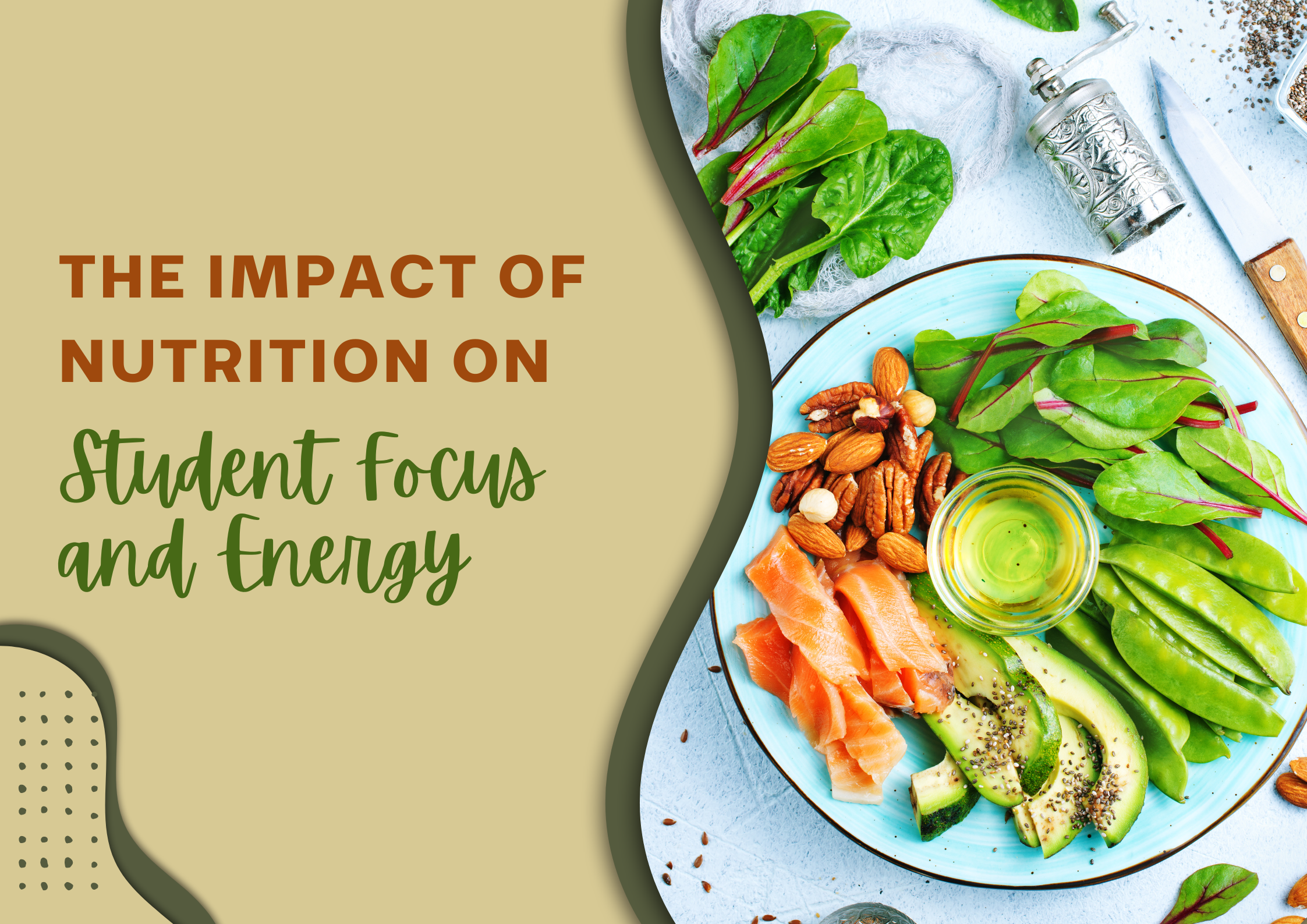The importance of nutrition
The importance of nutrition in the context of student focus and energy cannot be overstated. Nutrition plays a pivotal role in supporting overall health, but its impact on cognitive functions and academic performance is particularly significant. As students navigate the challenges of education, providing them with adequate and proper nutrition becomes crucial for optimizing their mental and physical capabilities.
Thesis statement: The impact of nutrition on student focus and energy is crucial for academic success.
The central thesis of this exploration is the fundamental connection between nutrition and academic success. By understanding the role nutrition plays in sustaining focus and energy levels, educators, parents, and policymakers can make informed decisions to enhance the learning environment for students.
Nutritional Basics
Definition of nutrition
Nutrition encompasses the intake of food and its utilization by the body for growth, development, and maintenance of health. It involves the study of various nutrients present in food and their effects on the body’s physiological functions.
Key nutrients for optimal brain function
Macronutrients (carbohydrates, proteins, fats)
Carbohydrates:
These are the primary energy source for the body, including the brain. Complex carbohydrates, found in foods like whole grains, provide a sustained release of energy crucial for maintaining focus and attention.
Proteins:
Essential for the synthesis of neurotransmitters, proteins contribute to cognitive functions and help in maintaining a stable mood. Sources include lean meats, dairy products, and plant-based options like legumes.
Fats:
Omega-3 fatty acids, found in fish and certain plant oils, are particularly important for brain health and cognitive development. They play a role in enhancing memory and concentration.
Micronutrients (vitamins and minerals)
Vitamins:
Essential for various biochemical processes, vitamins such as B-complex vitamins (B6, B12, folic acid) and vitamin C are crucial for brain function and energy metabolism.
Minerals:
Minerals like iron, zinc, and magnesium play a role in neurotransmitter synthesis, oxygen transport, and overall brain health.
Importance of a balanced diet
A balanced diet ensures that individuals receive the necessary nutrients in the right proportions. This includes a variety of foods from different food groups to provide a broad spectrum of essential nutrients.
A lack of balance in the diet can lead to nutritional deficiencies, impacting both physical and mental well-being.
The Brain-Body Connection

Overview of the relationship between nutrition and brain health
The brain is a highly metabolically active organ that requires a constant supply of energy and nutrients.
The relationship between Impact of Nutrition on Studentand brain health is bidirectional – the brain influences dietary choices, and diet influences brain function.
Explanation of how nutrients influence cognitive functions
Glucose and brain energy
Glucose:
As the primary energy source for the brain, glucose is crucial for cognitive functions. Stable blood glucose levels are associated with sustained attention and better cognitive performance.
Omega-3 fatty acids and cognitive development
Omega-3 fatty acids:
These essential fatty acids, particularly docosahexaenoic acid (DHA), are critical for brain development and function. They are found in high concentrations in the brain and contribute to synaptic plasticity, neurotransmission, and neuroprotection.
Impact of Nutrition on Student Focus
Discussion of the role of nutrition in maintaining concentration
Sustaining concentration and attention is a key factor in academic success. Nutrition plays a pivotal role in achieving and maintaining optimal focus throughout the day.
Examples of specific nutrients and their effect on focus
Complex carbohydrates
Role in focus:
Complex carbohydrates, found in foods like whole grains, legumes, and vegetables, provide a steady release of glucose. This ensures a sustained supply of energy to the brain, supporting prolonged periods of concentration.
Protein-rich foods
Role in focus:
Proteins, through the synthesis of neurotransmitters like dopamine and serotonin, contribute to mood regulation and focus. Including protein-rich foods such as lean meats, eggs, and dairy products in the diet can positively impact concentration.
Hydration and its impact on attention
Role in focus:
Dehydration can impair cognitive function, including attention and short-term memory. Proper hydration ensures optimal brain function and helps students stay alert and focused during classes.
Influence of Nutrition on Energy Levels
Examination of how nutrition affects energy levels throughout the day
Maintaining consistent energy levels is essential for sustained academic performance. Nutrition directly influences the body’s energy production and utilization.
Discussion of the role of breakfast in sustaining energy
Importance of breakfast
Role in energy:
Breakfast provides the body with the necessary fuel after an overnight fast. A balanced breakfast, including carbohydrates, proteins, and fats, helps kickstart metabolism and sustains energy levels throughout the morning.
The impact of nutrient timing on energy fluctuations
Balanced meals and snacks
Role in energy:
Consuming balanced meals and snacks throughout the day helps regulate blood glucose levels, preventing energy crashes. Nutrient-dense snacks, such as fruits and nuts, can be effective in maintaining steady energy levels.
Common Nutritional Challenges for Students

Overview of common dietary issues among students
Students often face challenges in maintaining a healthy diet due to various factors, including lifestyle, peer influences, and limited access to nutritious foods.
Discussion of the influence of fast food and processed snacks
Fast food culture
Impact on nutrition:
The prevalence of fast food culture can lead to excessive consumption of processed foods high in unhealthy fats, sugars, and sodium. These foods may contribute to nutritional imbalances and negatively affect focus and energy.
Lack of time and its impact on meal choices
Role of time constraints
Impact on nutrition:
Busy schedules and academic pressures may result in students opting for convenient but nutritionally poor food choices. This lack of time for meal preparation can contribute to deficiencies in essential nutrients.
Strategies for Improving Student Nutrition
Promotion of healthy eating habits
Promoting healthy eating habits involves creating an environment that encourages and supports nutritious food choices among students.
School-based nutrition programs
Importance of school-based programs
Role in nutrition:
School-based nutrition programs play a crucial role in educating students about the Impact of Nutrition on Student and providing access to balanced meals. These programs can include nutrition education, school gardens, and collaborations with local farmers.
Collaboration between schools and parents to enhance nutritional education
Parental involvement
Role in education:
Collaboration between schools and parents is vital for reinforcing nutritional education. Parents can play an active role in supporting healthy eating habits at home, complementing the efforts made within the school environment.
Case Studies
Examples of schools implementing successful nutrition programs
Highlighting case studies of schools that have successfully implemented Impact of Nutrition on Student and nutrition programs provides real-world examples of the positive impact of such initiatives.
Results and improvements observed in student focus and energy
Documenting the outcomes of these programs, including improvements in student focus, academic performance, and overall well-being, adds empirical support to the argument for prioritizing nutrition in educational settings.
Conclusion
Recap of the importance of nutrition for student focus and energy
In conclusion, the intricate relationship between nutrition and student focus and energy underscores the importance of prioritizing healthy eating habits within the educational system.
Call to action for schools, parents, and policymakers to prioritize nutrition for academic success
A call to action is essential, urging schools, parents, and policymakers to recognize the critical impact of nutrition on student academic success. By implementing and supporting initiatives that promote healthy eating habits, the education system can contribute significantly to the holistic development of students.













